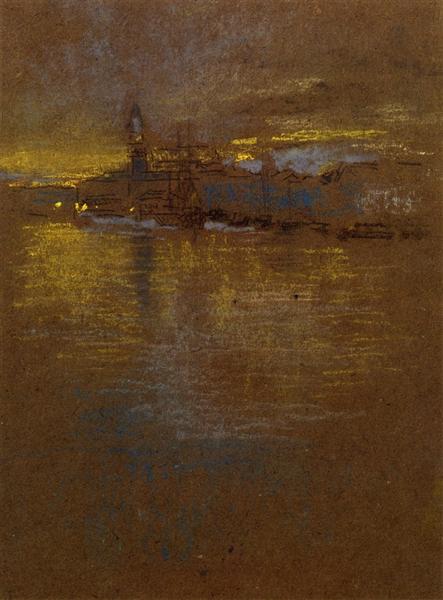Description
The painting * Vista on the * (1880) lagoon by James McNeill Whistler is a work that encapsulates the very essence of the aesthetic movement that arose at the end of the 19th century, and that sought to emphasize visual beauty over all other aspects. This work, in particular, offers a serene and ethereal vision of the Venetian lagoon, achieved through a masterful combination of technique and composition that characterizes Whistler's style.
In this painting, the first impression is that of a subtle melancholy. The choice of color plays a crucial role. Whistler uses a palette of tones off and soft, predominantly the shades of blue and gray, which evoke an atmosphere of tranquility and introspection. This election is not accidental, but a manifestation of the tonal approach that the artist developed throughout his career, influenced in part by his studies at the Academy of Fine Arts of Paris and his admiration for masters like Diego Velázquez and J.M.W. Turner
The scenario is the iconic Laguna of Venice, famous for its soft light and its ability to reflect the passage of time in its waters. In this work, however, representation is more abstract, almost contemplative. The lagoon extends towards the horizon under a hacking sky, while vagas silhouettes of architectural structures, possibly churches or palaces, which barely emerge from the mist. These imprecise forms invite the viewer to complete the scene in their mind, making use of the imagination to glimpse Venetian architectural beauty.
Whistler's brushstroke is light and fluid, in some almost evanescent areas. This style helps create a sense of movement and immediacy, as if the scene could fade at any time. There is no explicit human or animal presence in the work, which can be interpreted as an attempt to concentrate all attention on the interaction between light, water and sky, elements that Whistler handles with mastery.
Another notable characteristic of the work is the use of space and composition. The paint is structured so that the horizon divides the image by approximately equal halves. This symmetry grants a visual balance that is reinforced by the disposition of shapes and colors. The upper part, dominated by the sky, has a degraded of clear tones that intensify slightly towards the center. In contrast, the lower part reflects this in the lagoon, with a touch of depth that suggests the calm of the waters.
Whistler's technique in this work reflects its involvement with the art of Japanese, which influenced numerous western artists of their time. The simplification of forms and predilection for minimalist landscapes can be seen as a western adaptation of the Ukiyo-E, the famous Japanese prints that captured fleeting moments and daily scenes with great elegance and media economy.
In the context of his vast work, * View on the lagoon * can be compared to others paintings of the same period, such as the * nightlife series * that Whistler did during his stay in Chelsea, London. In these paintings, Whistler also used dark and medium shades to create atmospheres loaded with mystery and tranquility. In both series, the artist shows an unparalleled ability to capture the ephemeral essence of his subjects, leading the viewer to a visual experience that goes beyond mere representation.
In summary, * View about the lagoon * is a sublime manifestation of the ability of James McNeill Whistler to transform a daily view into a deeply moving aesthetic experience. Its mastery of color, composition and artistic technique combine to offer a window to a world of serenity and poetry that, once observed, leaves an indelible impression on the viewer's memory.
KUADROS ©, a famous paint on your wall.
Hand-made oil painting reproductions, with the quality of professional artists and the distinctive seal of KUADROS ©.
Art reproduction service with satisfaction guarantee. If you are not completely satisfied with the replica of your painting, we refund your money 100%.

